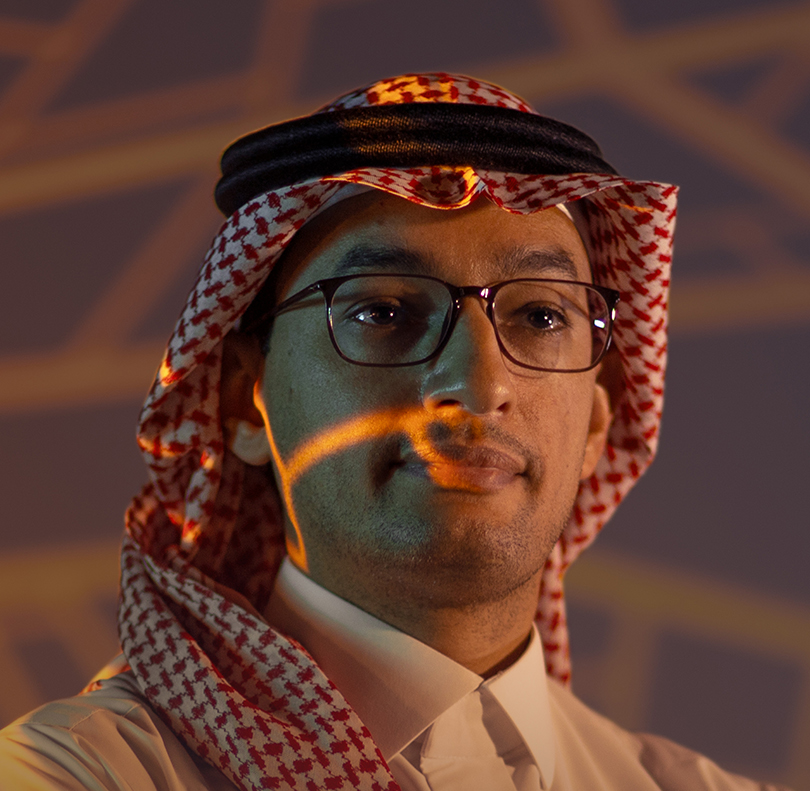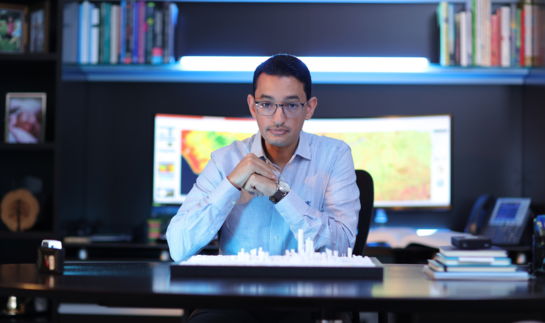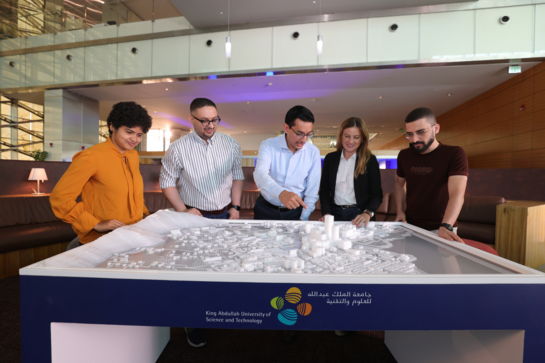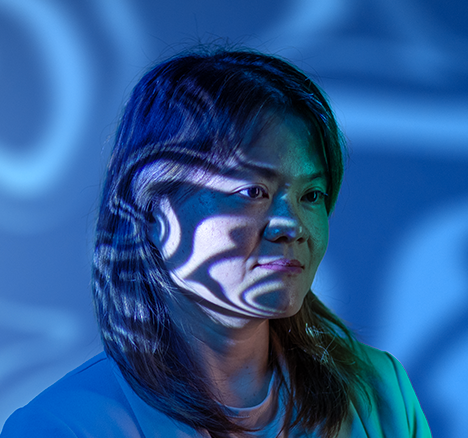SAMI G.
AL-GHAMDI
on a
mission
to harness data to design sustainable cities.
Growing up in Saudi Arabia’s mountainous Al-Bahah region, Professor Sami G. Al-Ghamdi was accustomed to the slower, quieter pace of life in the countryside. The bustle of Riyadh, where he first moved to study architecture and building science at King Saud University, came as a shock — but it also sparked his curiosity and turned his outsider’s perspective toward addressing the biggest challenges in sustainable urban design.
“It opened my eyes to how complex cities are, including transportation, energy, water, and flows of materials such as cement, aluminum, and steel,” Al-Ghamdi says, smiling. “I became curious about how these systems interrelate. Moving from a rural to an urban setting made me notice things I might not have seen if I had grown up in a city.”
We’re creating unique, field-ready technologies that are already making a difference. It’s not theoretical. These tools are in place. They work.”
Sami G. Al-Ghamdi

Curiosity grew into a passion for urban human ecosystems. After working as an architect, Al-Ghamdi pursued his master’s degree in civil and construction engineering at Western Michigan University, then a Ph.D. in civil and environmental engineering at the University of Pittsburgh, all the while haunted by the same question: How might science-based data guide design decision-making? In his next academic career move, he hoped to finally find the answer.
“I worked in multiple institutions, on different systems and products, which brought me to KAUST, aligned with the Kingdom’s national transformation. It felt natural to join.”

Al-Ghamdi founded the King Abdullah University of Science and Technology (KAUST) Urban Lab in 2022, serving as principal investigator. An associate professor of Environmental Science and Engineering, his research focuses on five pillars of the built environment: transportation, water, energy, materials, and indoor environments.
His work quantifies urban impacts on sustainability, resilience, and decarbonization, with computational models that assess climate change contributions while enhancing infrastructure.
“My research focuses on scientifically quantifying how our daily activities impact the environment, providing evidence to guide more sustainable choices,” he says. “For example, when you commute to work, you have options such as walking, taking a bus, riding a bike, or driving a car. Each mode has a different environmental impact.”
In transportation assessments, Al-Ghamdi explains, all conceivable factors impacting sustainability are considered. “We analyze the whole life cycle of activities — from raw material extraction, to processing, to use, and then end-of-life. So, what happens to that bus, or that scooter, or that bike when it’s retired? All the raw material that was extracted and contributed to the manufacturing is accounted for. That gives us a full picture.”
WATCH VIDEO
Professor Sami G. Al-Ghamdi
Transformational research
At the KAUST Urban Lab, Al-Ghamdi and his team apply computational models to real-world challenges, such as assessing how to cool Saudi cities more sustainably or determining the ideal combination of construction materials to minimize environmental impact over a development’s life cycle.
“It helps us understand the consequences of our decisions. If I want to build a city, then I can optimize material selection by comparing different available options. Which one has less impact on the environment? Then I will go for that. Which is more sustainable for the future of the city? The data helps us identify and select the better option.”
The benefits of Al-Ghamdi’s work extend from urban planning in the smallest Saudi town to optimizing resources for the Kingdom’s giga-projects. “This work is critical because Saudi Arabia is going through massive transformation. A huge number of projects are happening at the same time. Decision-makers want to build sustainably from the outset, and our research helps them do that.”
His lab includes master’s and Ph.D. students, postdocs, and scientists from disciplines ranging from economics to engineering. Together, they address major challenges, such as assessing the impacts of climate change on urban centers and quantifying the sustainability of different systems. Al-Ghamdi notes that the team’s mix of nationalities enriches the work with diverse perspectives on environmental challenges — a key asset for such a dynamic area of research.
“This perspective is unique. It may be challenging at the beginning, but it is rewarding and enjoyable. People learn significantly from one another because they bring different disciplines and experiences into the same space.”
Al-Ghamdi, recently appointed associate dean for Research and Partnerships in KAUST’s Biological and Environmental Science and Engineering (BESE) Division, has also been active on the entrepreneurial front, with ventures already proving instrumental in the Saudi market. “I have launched two startup companies at KAUST as a direct translation of my research,” he says.
Building resilient futures
Sustainability is not a destination but a journey, Al-Ghamdi says. “Humanity must continuously pursue better solutions. So, sustainability, in my perspective, is always a pursuit of perfection. When I quantify the environmental impact of cement, for example, in five years, the cement industry will likely improve. A product labeled as ‘sustainable’ today will not remain so forever — it simply reflects a measurable environmental impact at a given point in time.”

By providing scientific data to guide planners and policymakers, Al-Ghamdi believes his team’s work will shape more sustainable cities and inform urban agendas in Saudi Arabia and around the world. It is a passion he traces to his move from a rural upbringing to an urban setting years ago, where he first recognized the complexity of city life.
“From the moment I flipped from a rural to an urban setting, I saw the differences. Maybe if I had grown up urban, I wouldn’t have noticed these things, but I noticed because I went from a village to a big center. I saw how the different systems connect to one another. Now, I’m on a mission to secure a sustainable future.”
Learn more about KAUST and our mission-driven research
KAUST shall be a beacon for peace, hope and reconciliation, and shall serve the people of the Kingdom and the world.
King Abdullah bin Abdulaziz Al Saud, 1924 – 2015
Email: global.pr@kaust.edu.sa
Mailing address:
4700 King Abdullah University of Science and Technology
Thuwal 23955-6900
Kingdom of Saudi Arabia
FOLLOW US
© 2025 King Abdullah University of Science and Technology. All rights reserved.


